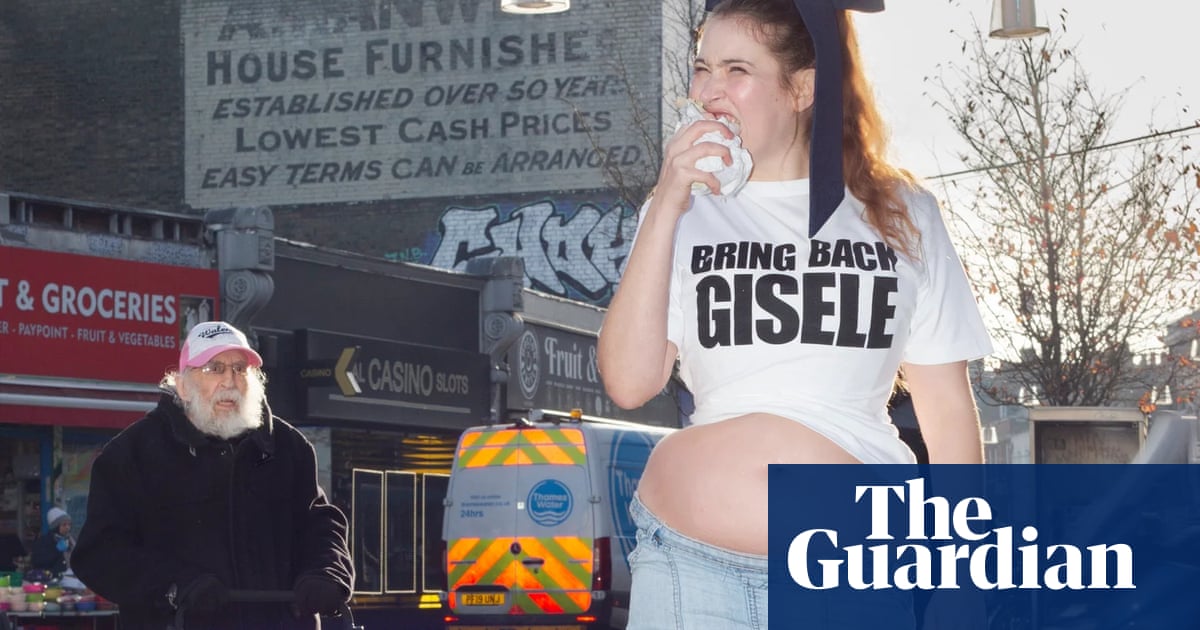
If the slogan T-shirt is now a familiar sight, a sub-category is on the rise: the “clapback T-shirt”, which, in 2023, comes with a statement responding to online criticism.
This week, Michaela Stark, a subversive visual artist who was trolled after a recent collaboration with the lingerie brand Victoria’s Secret, was photographed in a T-shirt that read “Bring Back Gisele”.
It was a direct quote from one commenter on Instagram who expressed a desire that Gisele Bündchen, the Brazilian supermodel and former Victoria’s Secret Angel replace Stark, whose work champions body positivity.
“Bring back skinny models,” wrote another commenter. “What happened to our slim butterflies?” asked another.
Stark, whose designs have been worn by Beyoncé, is known for lingerie that binds and sculpts the body, emphasising the parts that convention tells women to be ashamed of, and challenging beauty norms.
She had been hired by Victoria’s Secret to help with its rebrand. Its show, a worldwide TV event, was cancelled in 2018 after criticism of the company’s use of models who meet exacting weight and body fat requirements through strict dieting and relentless exercise.
Stark and two other models had worn her designs on the VS World Tour 2023 – which replaced the show – in September. The “woke rebrand”, as one commentator called it, was lambasted as performative. For Stark, it exposed her to fatphobia that reportedly culminated in her personal Instagram account being suspended.
The Bring Back Gisele T-shirt is a collaboration with the clothing label Sports Banger, and it is available for £40 in sizes small to XXXL. Sports Banger has a history of making slogan tees that stand up for people it sees as wronged by the media or mainstream. One, from 2013, reads “Free Tulisa” in response to the pop star Tulisa Contostavlos’s court case. Another reads “Team Nigella” in reference to the acrimonious divorce of Nigella Lawson and Charles Saatchi.
“The campaign was a stroke of genius,” says J’Nae Phillips, the culture editor and author of the Fashion Tingz newsletter, referencing the new design. It “[takes] trolling the trolls one step further, with Stark appearing in a series of shots while chomping on a kebab.”
The T-shirt lands at a time when fatphobia in the industry is in the spotlight. The model Paloma Elsesser left Instagram this month after online abuse, having just become the first curve model to win Model of the Year at the Fashion Awards.
Other recent examples of clapback T-shirts include one Victoria Beckham released in November that reads “My dad had a Rolls-Royce”, referencing a claim she made in the Netflix documentary Beckham, that she came from a working-class background, despite her father driving her to school in a Rolls-Royce.
Earlier, the New York brand Vaquera clapped back at one commenter with a T-shirt that read “Obscene dress” quoting what had been written under one of their designs on social media.
And in January, at the peak of discussion about “nepo babies”, a loaded way to describe someone who has high-profile parents in their field, Hailey Bieber, the daughter of the actor Stephen Baldwin, wore a tee that said, simply: “Nepo Baby”.
In a pre-social media era, they were a way for celebrities to quietly articulate their frustrations. “When Britney wore a T-shirt with the slogan ‘I’m a virgin (but this is an old T-shirt)’ she was reflecting back a public’s very gruesome obsession with her sexuality, all while just popping out to the shops and without saying a word,” says Michael Cragg, the author of Reach for the Stars: 1996–2006: Fame, Fallout and Pop’s Final Party.
“It’s about finding a succinct way of turning powerlessness into power,” says Cragg. By taking the Gisele line and “transforming it into a slogan that subtly highlights how far there still is to go in body equality in fashion, it can become empowering”.












